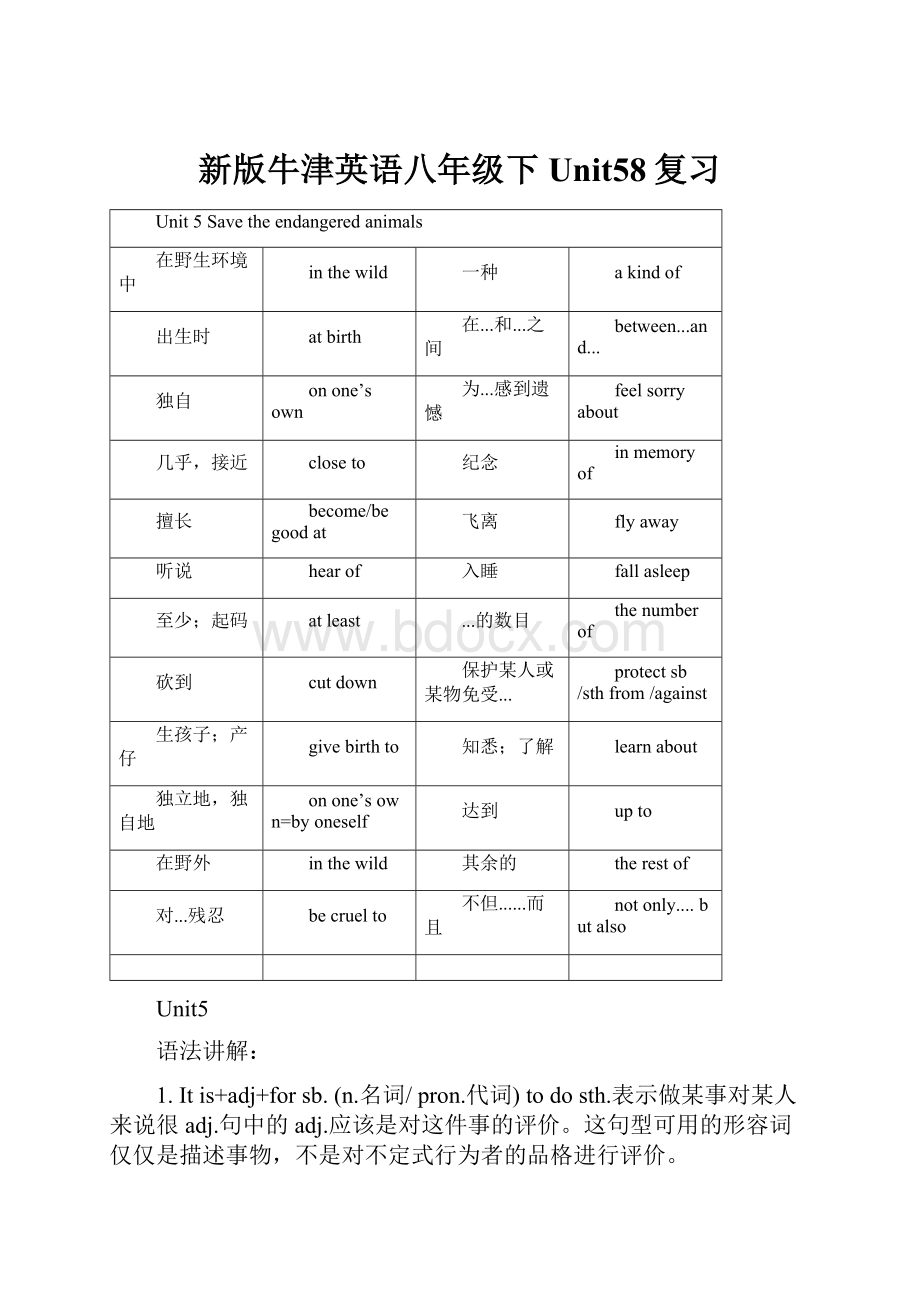新版牛津英语八年级下Unit58复习.docx
《新版牛津英语八年级下Unit58复习.docx》由会员分享,可在线阅读,更多相关《新版牛津英语八年级下Unit58复习.docx(24页珍藏版)》请在冰豆网上搜索。

新版牛津英语八年级下Unit58复习
Unit5Savetheendangeredanimals
在野生环境中
inthewild
一种
akindof
出生时
atbirth
在...和...之间
between...and...
独自
onone’sown
为...感到遗憾
feelsorryabout
几乎,接近
closeto
纪念
inmemoryof
擅长
become/begoodat
飞离
flyaway
听说
hearof
入睡
fallasleep
至少;起码
atleast
...的数目
thenumberof
砍到
cutdown
保护某人或某物免受...
protectsb/sthfrom/against
生孩子;产仔
givebirthto
知悉;了解
learnabout
独立地,独自地
on one’s own=by oneself
达到
up to
在野外
in the wild
其余的
the rest of
对...残忍
be cruel to
不但......而且
not only.... but also
Unit5
语法讲解:
1. It is+adj+for sb. (n.名词/ pron.代词) to do sth.表示做某事对某人来说很adj.句中的adj.应该是对这件事的评价。
这句型可用的形容词仅仅是描述事物,不是对不定式行为者的品格进行评价。
这类形容词有:
difficult;convenient;important;(im)possible;hard;possible;dangerous;necessary;easy......。
练习:
①对孩子们来说,穿过繁忙的街道很危险 It’s very_______ ________ children to cross the busy street.
②对我们来说,完成这项工作很困难 It’s_______ _______ us to finish the work.
③拥有健康的饮食习惯对我们来说很必要 It’s ______ _______ us to have healthy eating habits.
④保护环境对我们来说很重要 It’s_______ ________ us to protect the environment.
2. It is+adj+of sb. (n.名词 /pron代词) to do sth.表示某人做某事是adj. 句中的adj.应该是对这个人做这件事的评价,形容词多用形容人的。
这句型可用的形容词是描述不定式行为者的性格,品质的。
这样的形容词有:
bad;brave;careless;clever;cruel;silly;foolish;generous;good;kind;mean;polite;right;rude;wise;wrong......。
练习:
①你离开他是很明智的 。
It is______ _______ you to leave him.
②你能帮我,真好。
It’s very_______ ______ you to help me.
③你真聪明,解出了这道数学题。
It’s_______ _______ you to work out the maths problem.
注意区别:
Of sb.的句型通常都可以转换为不定式作状语的句子,但for sb.句型不可以。
如:
①It’s very nice of you to offer me a seat. =You are nice to offer me a seat.
②It is careless of him to lose so many things. =He is careless to lose so many things.
练一练:
It’s kind of you to help me.=.
. =You are right to do that.
3. adj.+enough+(not) to do足以adj.(而不)去做某事。
enough是副词,修饰前面的形容词,表示程度,enough后面的动词不定式表示结果。
因此,“形容词+enough+动词不定式”结构可以用 “so...that...”结构改写。
John is strong enough to carry the box. =John is so strong that he can carry the box.
练习:
①他足够大以至于能完成这项任务。
He is________ ________ ________ finish this task.
②他足够聪明可以顺利地做一名领导者。
He is_______ _______ _______ be a leader.
③It is difficult enough________ _______ _______ this problem.(work out)
④He is rich enough_______ _______ this new car.(buy)
⑤She is pretty enough_______ _______ the gentlemen.(attract)
Unit6
Unit6Pets
使牙齿发出喀嚓声
clickone’steeth
一小部分
asmallnumberof
正面交锋
headtohead
更为重要的是
What’smore
养宠物狗
keeppetdogs
除了...别无选择
havenochoicebuttodo
关于某事的观点
opiniononsth
四处只有走动
runfree
抱住某物
holdsthinone’sarm
投诉某人某事
makeacomplainttosbaboutsth
看见某人做某事
seesbdosth
回应投诉
respondtocomplaints
从...学习
learn...from...
对...忠诚
befaithfulto
根据
accordingto
死于
dieof
照顾;照料
carefor
继续做某事
keepondoingsth
朝...吠叫
barkat
金鱼缸
fishtank
防止某人做某事
stop/keepsbfromdoingsth
懒散度日
liearound
语法(副词):
一副词的定义:
副词用来修饰动词、形容词和其他副词等,使它们的意思更清楚、更准确、更完整,说明时间、地点、程度、方式等。
yesterday昨天here这儿often经常quite很quickly快速happily幸福地
二规则副词级的构成:
1.副词的比较级形式是在副词末加-er或其前面加more;最高级形式是在词末加-est或在其前面加most。
形式变化一般有如下规则:
(总结)
①fasthard②late
③dry④bigthinhot
⑤happysimpleclevernarrow⑥carefullyquicklydifficultbeautiful
巧记比较等级构成:
“比较”与“最高”,“单音”加后缀;-er是“比较”,-est是“最高”。
原级结尾若是e,只加-r或-st。
重读闭音节,辅音要成对,其它多音节,加词不加缀。
辅音若加y,y变i加后缀。
y若是后来加,不在此规内。
2.不规则形容词的级的构成
不规则形容词的级的变化是不规则的,只能记住。
good/well→better→bestbad/ill/badly→worse→worst
Many/much→more→mostFar→farther/further→farthest/furthestold→older/elder→oldest/eldest
三常见的容易混淆的副词:
1.late与lately
late意为“晚;晚”;lately意为“最近”。
例如:
Youhavecometoolate.你来得太晚了。
Ihaven’tseenMarylately.我最近没有看到Mary。
2.wide与widely
wide表示空间宽度;widely意为“广泛地”。
例如:
Heopenedthedoorwide.他把门大开着。
Englishis
widelyusedintheworld.英语在世界范围内被广泛使用。
四常见的兼做形容词与副词的单词及其比较级和最高级形式:
单词
比较级
最高级
词性及释
义
例句
hard
harder
hardest
adj.困难的,坚硬的
Thepinenutisveryhard.
adv.用力地,努力地
Don’thitsohard!
high
higher
highest
adj.高的
Thatisahighbuilding.
adv.在高处
Thekiteisflyinghighinthesky.
early
earlier
earliest
adj.早的
Let’smakeanearlystarttomorrow.
adv.早;较早
Iwokeupearlythismorning.
far
farther
farthest
adj.远的
Isawheronthefarsideoftheroad.
adv.远
Helookeddownatthetrafficfarbelow.
well
better
best
adj.身体健康的
Iamverywelltoday.
adv.好;对
Thekidsallbehavedwell.
loud
louder
loudest
adj.大声的
Themusicistooloud.Pleaseturnitdown.
adv.大声地
Hespokeloudenough.Everyoneintheroomcouldhearwhathesaid.
五英语中形容词变副词的方法:
1.在形容词词尾直接加-ly。
如:
real-really; helpful-helpfully; quick-quickly;
2.以辅音字母加y结尾的形容词要变y为i,然后再加-ly。
如:
busy-busily; angry-angrily; easy-easily
3.以e结尾的形容词变副词时,一般有以下三种情况:
①一般情况下,直接在后面加ly,如:
completely,strangely等;
②以-ble结尾的形容词,将-ble变成bly.如:
possibly,probably等;
③去掉e,加ly的情况极少数,truly是比较常见的。
口诀:
一般直接加,“元e”去e加,“辅y”改i加,“le”结尾e改y。
分别举例如下:
quick—quickly, true—truly, happy—happily, possible—possibly.
七副词及其基本用法:
副词主要用来修饰动词,形容词,副词或其他结构。
1.副词的位置:
①在动词之前;② 在be动词、助动词之后;③多个助动词时,副词一般放在第一个助动词后。
注意:
a. 大多数方式副词位于句尾,但宾语过长,副词可以提前,以使句子平衡。
We could see very clearly a strange light ahead of us.
b. 方式副词well,badly糟、坏,hard等只放在句尾。
He speaks English well.
2.副词的排列顺序:
① 时间,地点副词,小单位的在前,大单位在后。
②方式副词,短的在前,长的在后,并用and或but等连词连接。
Please write slowly and carefully.
③多个不同副词排列:
程度+地点+方式+时间副词。
注意:
副词very 可以修饰形容词,但不能修饰动词。
改错:
(错) I very like English.
(对) I like English very much.
注意:
副词enough要放在形容词的后面,形容词enough放在名词前后都可。
练习:
用所给单词的适当形式填空。
1. My purse was stolen on the bus yesterday. __________ (Fortunate), there was no money in it.
2. Mobile phones are _________ (wide) used in most of the cities in China.
3. He put on his coat and went out ________ (quick).
4. She is ______ (good) than Li Ping at swimming.
5. A lot Chinese people are _______ (pride) of Yao Ming, a famous basketball star in NBA.
6. To our surprise, he suddenly returned on a cold ______ (snow) night.
7. Allie asked me ______ (polite) to put the things away.
8. It’s snowing hard. You must drive ________(careful).
9. The earth we live on is _______ (big) than the moon.
10. Hainan is a very large island. It’s the second ________ (large) island in China.
Unit7
Unit7Theunknownworld
保持安静
besilent
醒来
Wakeup
因为
becauseof=asaresultof
往...外看
lookoutof
尽快
assoonaspossible=assoonasyoucan
向某人提及某事
mentionsthtosb=tellsbsthabout
同意某人意见
agreewithsb=havethesameopinionas
非常害怕
befrightenedof=beveryafraidof
恐惧地
infear=frightenedly=withfear
在...隔壁
nextto=closeto=beside
肯定
besure=believe
告诉某人关于某事
tellsbsthabout
成千上万
thousandsof=many
到达某地
reachsp=gettosp
在宇宙
inspace=intheuniverse
语法讲解(原因状语从句):
原因状语从句:
由because, for, as, since引导
(因为)的用法:
because通常表示直接的原因。
because引导的从句表示直接而明确的原因和理由,表示按因果关系的推断,语气很强,用来回答why的问题, 一般位于主句之后。
例:
We couldn't go out because it was too cold. 因为天气太冷,我们不能外出。
(因为)的用法:
for是并列连词,引出的原因较间接,似乎是事后所想到的补充解释的理由,只陈述一般推断的理由,不一定表示产生结果的必然原因,主要放在两个并列句之间。
例:
It must be morning for the birds are singing.一定是清晨了,因为鸟儿在叫。
注意:
下列情况下只能使用because:
①在回答why的问句时; ②被not所否定时。
和since(因为)的用法:
表示已经知道的原因时用as或since,即某种原因在说话人看来已经很明显,或已为听话人所熟悉。
since要比as正式一些,它们通常被置于语句之前。
Seeing all of the children already seated, he said,“Since everyone is here, let’s start.”
与because of的用法比较:
because 是连词,其后接句子;because of 是复合介词,其后接名词、代词、动名词、what 从句等。
如:
I didn’t buy it because it was too expensive. 我没有买是因为它太贵了。
He lost his job because of his age. 由于年龄关系他失去了工作。
Unit8
Unit8Lifeinthefuture
现在;此刻
inthepresent=forthetimebeing
和...连接
beconnectedto=belinkedto
在前面
atthefront
对...满意
besatisfied/happywith
在互联网上
ontheInternet
一种新型的
anewtypeof=anewkindof
...的形状
intheshapeof=intheformof
没做成
failtodo
使...与...相混合
mix...with=putsthandsthtogether
继续做某事
continuetodo=goondoingsth
准备...
prepareforsth=getreadyforsth
停止做
stopdoing
片刻;瞬间
没赶上飞机
misstheplane=notcatchtheplane
被当作...使用
beusedas
语法讲解(过去进行时态):
过去进行时表示过去某一时刻或者某段时间正在进行或发生的动作,常和表过去的时间状语连用,如:
I was doing my homework at this time yesterday.昨天的这个时候我正在做作业。
They were waiting for you yesterday.他们昨天一直在等你。
1.过去进行时的构成:
①肯定形式:
主语+was/were+V-ing
②否定形式:
主语+was not (wasn't)/were not (weren't)+V-ing
③疑问形式:
Was/Were+主语+V-ing
2.基本用法:
①过去进行时表示过去某一段时间或某一时刻正在进行的动作。
常与之连用的时间状语有:
at that time/moment, (at) this time yesterday (last night/Sunday/week…), at+点钟+yesterday (last night / Sunday…),when sb. did sth等时间状语从句,如:
What were you doing at . yesterday 昨天晚上七点你在干什么
I first met Mary three years ago. She was working at a radio shop at the time. 我第一次遇到玛丽是在三年前,当时她在一家无线电商店工作。
I was cooking when she knocked at the door. 她敲门时我正在做饭。
②when后通常用表示暂短性动词,while后通常用表示持续性动词,因此它所引导的状语从句中,谓语动词常用进行时态,如:
When the car exploded I was walking past it.= While I was walking past the car it exploded.
③when用作并列连词时,主句常用进行时态,从句则用一般过去时,表示主句动作发生的过程中,另一个意想不到的动作发生了。
如:
I was walking in the street when someone called me. 我正在街上走时突然有人喊我。
④when作并列连词,表示“(这时)突然”之意时,第一个并列分句用过去进行时,when引导的并列分句用一般过去时。
如:
I was taking a walk when I met him. 我正在散步,突然遇见了他。
We were playing outside when it began to rain. 我们正在外边玩,这时下起雨来了。
3.一般过去时与过去进行时的用法比较:
一般过去时表示“在过去某个时间发生的动作或存在的状态”,而过去进行时则表示“在过去某个特定时间正在进行的动作”。
如:
I was reading an English novel last night. 昨晚我在看一本英文小说。
(可能没看完)
I read an English novel last night 我昨晚看了一本英文小说。
(已经看完)
练习:
1. I _____ (have) my breakfast at half past six yesterday morning.
2. Mary _____ (go) over her lessons from six to seven last night. John and peter ____(do) the same thing.
3. -What _____ you ___ (do) at that time -We _____ (watch) TV.
4. -Was your father at home yesterday evening -Yes ,he was. He _____ (listen) to the radio.
5. They _____(not make) a model ship when I sa